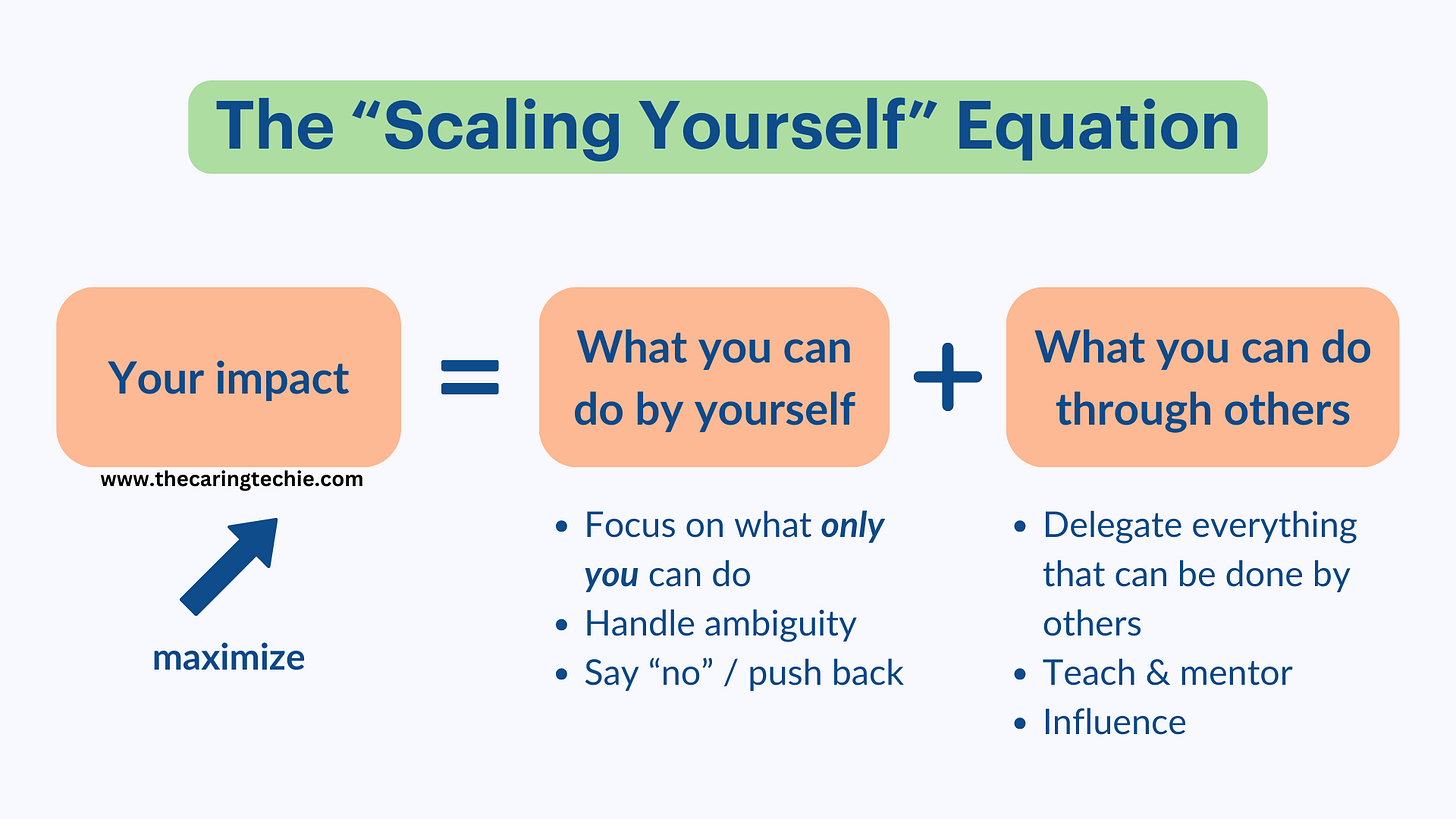3 Critical Skills You Need to Grow Beyond Senior Levels in Engineering
Applicable to both technical and managerial tracks
Throughout my career as a Software Engineer, I was fortunate to get promoted multiple times from Junior, to Mid-level, Senior, and Staff. The most difficult jump was from Senior to Staff.
Part of the reason is that I made a lateral move from Google to Uber, and also switched teams internally at Uber during that time. The other part is just the difficulty of the transition itself.
Advancing from Senior to Staff isn’t impossible, but it is significantly more difficult than prior promotions because you start facing some unique challenges.
I agree with Will Larson who compares it to graduating:
Before you graduate, you have clear grades, graduation requirements, exams, and someone else is responsible for teaching you how it works. After you graduate, there’s no framework at all. — Will Larson
In other words:
What gets you to senior won’t get you past senior. - Me
Whether you wish to stay on the technical track or switch to management, career progression beyond senior requires developing and mastering vastly different skills.
In today’s article, we discuss 3 of the most critical skills you need beyond senior.
1. Learning to scale yourself
Levels after senior come with significantly larger scope and increased expectations to make an impact. Sadly, they don’t also come with days longer than 24 hours or superhuman powers.
In the “scaling yourself” equation, your impact is what you can do on your own, combined with what you can accomplish through others. Maximizing impact becomes a problem of maximizing each component.
The challenge is that your individual impact is bound by how much time there is in a day, while the expectations are not. The only way to thrive under these conditions is to start investing heavily in what you can do through others.
How to build this skill:
Maximize what you can do on your own: by ruthlessly prioritizing your time, pushing back on activities that have small ROI, and focusing on areas where your input is crucial; for engineers, it often means less coding (if more junior people can do that piece of coding).
How you can maximize what you can do through others: by teaching & mentoring, delegating work, and influencing without authority; My advice is to teach as much as you can so you can delegate as much as you can.
The idea is to aim to offload as much as possible from the things that can (or could) be done by others and focus your efforts where they are most needed and where you can make the biggest impact.
Keep an eye out for a future article on this topic.
2. Navigating ambiguity
Ambiguity in engineering is a given, but for levels above senior, it grows significantly.
For tech products, ambiguity comes from all the problems where multiple strategies, interpretations of data, conflicting requirements, or incomplete specifications can lead to different approaches.
Sometimes you don’t even know if these problems are solvable or what problem should be worked on in the first place. Past senior levels, it is expected that you start contributing to finding and advocating for the most important problems that need to be solved.
Evaluating and choosing a solution in these situations became a game of making tradeoffs and taking chances.
How to build this skill:
For engineers and engineering leaders, the challenge is to navigate these uncertainties wisely.
The goal is to move a problem from a vague need all the way to a valid product as illustrated in this ambiguity lifecycle diagram.
Your job involves turning the unknown into the known and translating vague ideas into actionable plans. This often involves a blend of:
Detective work — ask the right questions, collect evidence, build a case theory, validate it
Isolating uncertainty to the smallest components and proving / disproving theories
Divide and conquer — breaking down the problem into smaller subproblems and tackling them systematically
Making informed decisions even with incomplete information
Being able to pivot as new information and feedback become available
Note: Future article on this topic coming up soon.
3. Influence without authority
Influencing without authority is an important skill for any software engineer. It becomes vital for people aiming to advance past senior levels irrespective of whether it’s on the technical track or the leadership track.
At the team level, to get anyone you don’t have formal authority over to do or stop doing something, your approach needs to be based on influence. At the organization level, the same principle applies. To align diverse groups towards a common goal, you need—you guessed it—influence.
Most people see influencing as figuring out the perfect words to use to convince someone of something we believe in. The reality is that it’s much less about that and much more about the credibility and personal connections you build over time.
To learn the mindsets, frameworks, and tools you need to influence and become influential at work, join the next cohort of “Impact through Influence in Engineering Teams”.
Hint: persuasion is only a small piece of the puzzle, the rest is all about how you show up at work, listening and connecting with people, communicating well, and finding mutually beneficial solutions.
That’s all folks. Thank you for reading.
Until next time,
The Caring Techie
Did you enjoy this article? Hit the ❤️ button or share it with a friend or coworker. 🙏🏻
Ready to grow your tech career with me? Here are 3 ways I can help:
Private coaching - I have 1 coaching spot left to work with me 1-1, email me at thecaringtechie@gmail.com or DM me to learn more!
Book a one-hour call where we can tackle your most pressing issues.





Great article. I especially loved the depiction of ambiguity lifecycle.
Your article was great! I loved reading it!